|
|
|
Sort Order |
|
|
|
Items / Page
|
|
|
|
|
|
|
| Srl | Item |
| 1 |
ID:
124382
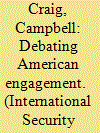

|
|
|
|
|
| Publication |
2013.
|
| Summary/Abstract |
In making their case for maintaining the United States' policy of "deep engagement," Stephen Brooks, John Ikenberry, and William Wohlforth stress that the U.S. security commitment to states in Europe, the Middle East, and East Asia, together with the formidable specter of American preponderance, stifles regional rivalries and hinders the resurgence of a dangerous era of multipolar power politics. The authors contend that a policy of U.S. retrenchment could spark the "return of insecurity and conflict among Eurasian powers," whereas a continuing policy of deep engagement, by "supplying reassurance, deterrence, and active management … lowers security competition in the world's key regions, thereby preventing the emergence of a hothouse atmosphere for growing new military capabilities." In short, they suggest, deep engagement reduces the chances of a major Eurasian war; a new strategy of retrenchment would increase them.
|
|
|
|
|
|
|
|
|
|
|
|
|
|
|
|
| 2 |
ID:
124380
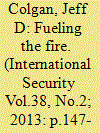

|
|
|
|
|
| Publication |
2013.
|
| Summary/Abstract |
What role does oil play in international security? While the threat of "resource wars" over possession of oil reserves is often exaggerated, the sum total of the political effects generated by the oil industry makes it a leading cause of war. Between one-quarter and one-half of interstate wars since 1973 have been connected to one or more oil-related causal mechanisms. Eight distinct mechanisms exist: resource wars, in which states try to acquire oil reserves by force; petro-aggression, whereby oil facilitates domestic political control of aggressive leaders such as Saddam Hussein or Ayatollah Ruhollah Khomeini; externalization of civil wars in petrostates; financing for insurgencies, such as Iranian oil money to Hezbollah; conflicts over potential oil-market domination, such as the United States' conflict with Iraq over Kuwait in 1991; control over transit routes, such as shipping lanes and pipelines; oil-related grievances, whereby the presence of foreign workers in petrostates helps extremist groups such as al-Qaida recruit locals; and as an obstacle to multilateral cooperation, such as when an importer curries favor with a petrostate to prevent multilateral cooperation on security issues. Understanding these mechanisms can help policymakers design grand strategy and allocate military resources
|
|
|
|
|
|
|
|
|
|
|
|
|
|
|
|
| 3 |
ID:
124377
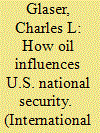

|
|
|
|
|
| Publication |
2013.
|
| Summary/Abstract |
How do states' oil requirements influence U.S. national security? Although a great deal of attention has focused on "energy security," scholars and policymakers lack satisfactory answers because little analysis links states' energy requirements with the probability of military conflict. Developing an analytic catalogue of the ways in which states' oil requirements could influence U.S. national security is the first step in closing this gap. Possible mechanisms include vulnerable access to oil that threatens a state's military capability; military policies designed to protect access to oil that threaten another state's military capability, which in turn create an access-driven security dilemma; and oil reserves that increase the value of territory, generating a conflict that draws in the United States via an alliance commitment. A distinctive feature of this framework is that some of these mechanisms identify threats to U.S. security that flow from another country's consumption of oil, not from U.S. consumption. Of particular importance is the potential danger that Chinese oil imports create for U.S. security-China's efforts to protect its sea lines of communication are fueling military competition that could strain U.S.-China relations and increase the probability of conflict between them. Policy options for dealing with these dangers share little with the standard options prescribed for dealing with the dangers related to Persian Gulf oil and U.S. oil consumption.
|
|
|
|
|
|
|
|
|
|
|
|
|
|
|
|
| 4 |
ID:
124375
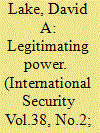

|
|
|
|
|
| Publication |
2013.
|
| Summary/Abstract |
The United States has maintained international hierarchies over the Western Hemisphere for more than a century and over Western Europe for nearly seven decades. More recently, it has extended similar hierarchies over states in the Middle East. How does the United States exercise authority over other countries? In a world of juridically sovereign states, how is U.S. rule rendered legitimate? Hierarchy has interstate and intrastate distributional consequences for domestic ruling coalitions and regime types. When the gains from hierarchy are large or when subordinate societies share policy preferences similar to those of the United States, as in Europe, international hierarchy is possible and compatible with democracy. When the gains from hierarchy are small and the median citizen has policy preferences distant from those of the United States, as in Central America, international hierarchy requires autocracy, and the benefits of foreign rule will be concentrated within the governing elite. In the Middle East, the gains from hierarchy also appear small, and policy preferences are distant from those of the United States. As a result, the United States has backed sympathetic authoritarian rulers. Although a global counterinsurgency strategy might be viable over the long term, the costs of establishing effective hierarchies in the region imply that the United States is better off retrenching "East of Suez."
|
|
|
|
|
|
|
|
|
|
|
|
|
|
|
|
| 5 |
ID:
124371
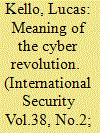

|
|
|
|
|
| Publication |
2013.
|
| Summary/Abstract |
Security policy in the information age faces formidable challenges. Chief among these is to evaluate correctly the impact of cyberweapons on strategy: Does the new technology require
a revolution in how scholars and policymakers think about force and conºict?1 Practitioners confront a predicament in addressing this question: the cyber revolution gives rise to novel threats and opportunities requiring immediate policy responses; yet understanding its nature and its consequences for security is a slow learning process. Interpretation of cyber phenomena involves analysis of a new body of experience that existing theories may be unable to clarify. It presupposes, moreover, a technical understanding of a transforming technology, whose implications require time to master because of its scientific complexity.
|
|
|
|
|
|
|
|
|
|
|
|
|
|
|
|
| 6 |
ID:
124373
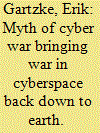

|
|
|
|
|
| Publication |
2013.
|
| Summary/Abstract |
A blitz of media, punditry, and official pronouncements raise the specter of war on the internet. Future conflicts may well take place in cyberspace, where victory or defeat could be determined in mere "nanoseconds."1 Secretary of Defense Leon Panetta has even warned of a "cyber-Pearl Harbor."2 Nor are fears of cyberwar abstract speculation. Events such as the denial of service attacks against Estonian and Georgian government websites, the Stuxnet worm designed to disable Iranian nuclear centrifuges, and the recent hacking of U.S. military computer networks seem to indicate that the era of cyberwar has already arrived.
|
|
|
|
|
|
|
|
|
|
|
|
|
|
|
|
|
|
|
|
|